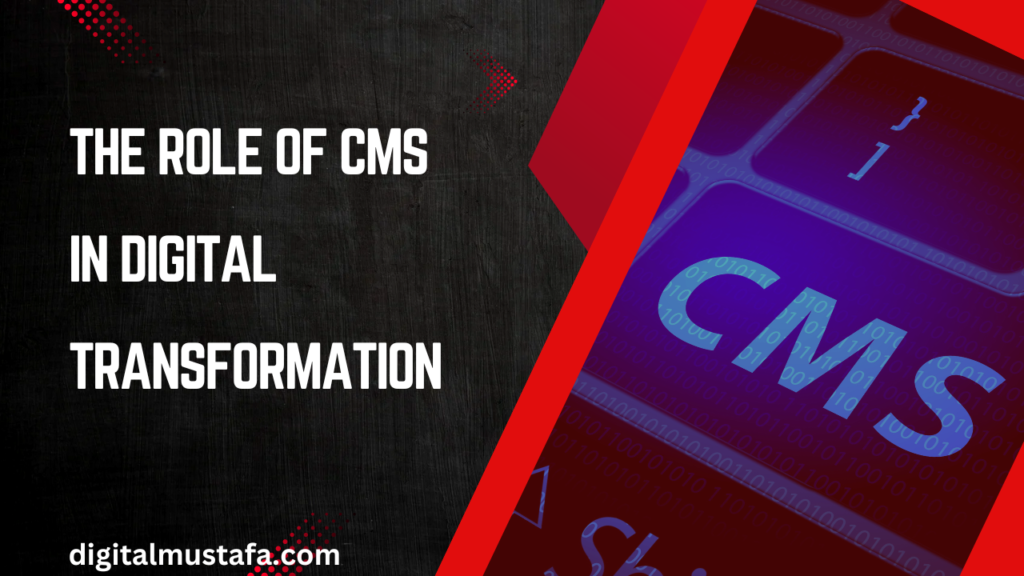In today’s fast-paced digital world, businesses are under constant pressure to adapt and evolve. The Role of CMS in Digital Transformation has become a key driver of change, enabling organizations to improve efficiency, enhance customer experiences, and stay competitive in an increasingly digital marketplace. At the heart of this transformation is the Content Management System (CMS), a critical tool that empowers businesses to manage, deliver, and optimize digital content across multiple channels.
This blog post will explore the pivotal role of CMS in digital transformation, highlighting how it facilitates seamless content management, enhances customer experiences, and supports the broader goals of digital strategy. Whether you are a business leader, IT professional, or digital marketer, understanding the impact of CMS on digital transformation is essential for leveraging its full potential.
Understanding Digital Transformation
Digital transformation is the process of integrating digital technologies into all areas of a business, fundamentally changing how organizations operate and deliver value to customers. It involves the adoption of new tools, processes, and cultural shifts to meet the evolving demands of the digital age.
Key Components of Digital Transformation
- Customer Experience: Improving the way customers interact with your brand through personalized, omnichannel experiences.
- Operational Efficiency: Streamlining internal processes and workflows to increase productivity and reduce costs.
- Data-Driven Decision Making: Leveraging data analytics and insights to make informed business decisions.
- Innovation and Agility: Fostering a culture of innovation that allows businesses to quickly adapt to market changes and emerging technologies.
Quote: “Digital transformation is not just about technology; it’s about rethinking the way we do business in the digital age.” — John Doe, Digital Transformation Expert
Example Table: Key Components of Digital Transformation
| Component | Description | Importance to Business Success |
|---|---|---|
| Customer Experience | Enhancing customer interactions through digital channels | Increases customer satisfaction and loyalty |
| Operational Efficiency | Streamlining processes to improve productivity | Reduces costs, increases profitability |
| Data-Driven Decision Making | Using data to inform business decisions | Leads to more accurate, strategic choices |
| Innovation and Agility | Encouraging innovation and adaptability | Keeps businesses competitive, fosters growth |
The Role of CMS in Digital Transformation
A Content Management System (CMS) is a software platform that allows businesses to create, manage, and publish digital content across various channels. It plays a crucial role in digital transformation by enabling organizations to deliver personalized, consistent, and engaging experiences to their customers.
1. Centralized Content Management
One of the primary benefits of a CMS is the ability to centralize content management. Instead of managing content across multiple platforms and systems, a CMS provides a single, unified platform where content can be created, edited, and distributed. This centralization is essential for maintaining consistency and ensuring that content is up-to-date across all digital channels.
Benefits of Centralized Content Management:
- Consistency: Ensures that all content across websites, social media, and other digital platforms is consistent in messaging, tone, and branding.
- Efficiency: Reduces the time and effort required to manage content by eliminating the need to update multiple systems individually.
- Scalability: Makes it easier to scale content operations as the business grows, allowing for the seamless addition of new channels or regions.
Example Table: Benefits of Centralized Content Management
| Benefit | Description | Impact on Digital Strategy |
|---|---|---|
| Consistency | Uniform content across all digital channels | Enhances brand image, improves customer trust |
| Efficiency | Streamlined content management processes | Saves time and resources, increases productivity |
| Scalability | Ability to easily expand content operations | Supports business growth, enables global reach |
2. Personalization and Customer Experience
Personalization is a key aspect of digital transformation, and CMS platforms play a critical role in delivering personalized experiences to customers. Modern CMS platforms use data and analytics to tailor content to individual users based on their preferences, behavior, and interaction history.
How CMS Supports Personalization:
- User Segmentation: CMS platforms allow businesses to segment their audience based on various criteria, such as demographics, behavior, or purchase history. This segmentation enables targeted content delivery that resonates with specific groups of users.
- Dynamic Content: CMS platforms can deliver dynamic content that changes based on the user’s context, such as location, device, or time of day. This ensures that users receive relevant content that meets their needs at any given moment.
- Omnichannel Experience: A CMS can manage content across multiple channels, ensuring that users receive a consistent experience whether they interact with the brand through a website, mobile app, social media, or email.
Quote: “In the digital age, personalization is no longer a luxury; it’s a necessity. A CMS enables businesses to deliver the personalized experiences that today’s customers expect.” — Jane Smith, Customer Experience Specialist
Example Table: Personalization Features in CMS Platforms
| Feature | Description | Benefit to Customer Experience |
|---|---|---|
| User Segmentation | Dividing audience into targeted groups | Enables tailored content delivery, increases engagement |
| Dynamic Content | Content that adapts based on user context | Provides relevant, timely information, enhances satisfaction |
| Omnichannel Experience | Managing content across multiple platforms | Ensures consistent brand experience, improves loyalty |
3. Enhancing Collaboration and Workflow
Digital transformation often requires collaboration across different teams, including marketing, IT, design, and content creation. A CMS facilitates this collaboration by providing tools that streamline workflows and improve communication between departments.
Ways CMS Enhances Collaboration:
- Role-Based Access Control: CMS platforms allow administrators to assign different roles and permissions to team members, ensuring that each person has access to the tools and content they need while maintaining security and control.
- Content Approval Workflows: Many CMS platforms include content approval workflows that streamline the process of creating, reviewing, and publishing content. This ensures that all content meets the organization’s standards before it goes live.
- Real-Time Collaboration: Some CMS platforms offer real-time collaboration features that allow multiple team members to work on the same piece of content simultaneously, reducing bottlenecks and speeding up the content creation process.
Example Table: Collaboration Features in CMS Platforms
| Feature | Description | Benefit to Team Collaboration |
|---|---|---|
| Role-Based Access Control | Assigns specific permissions to users | Ensures security, improves workflow efficiency |
| Content Approval Workflows | Streamlines content creation and review | Maintains content quality, speeds up publication |
| Real-Time Collaboration | Allows multiple users to edit content simultaneously | Reduces delays, improves team productivity |
4. Supporting Data-Driven Decision Making
Data is at the core of digital transformation, and a CMS plays a vital role in collecting, analyzing, and leveraging data to make informed decisions. By integrating with analytics tools and customer relationship management (CRM) systems, a CMS can provide valuable insights into how content is performing and how users are interacting with it.
CMS and Data-Driven Decision Making:
- Content Performance Analysis: CMS platforms can track key metrics such as page views, time on page, bounce rates, and conversion rates. This data helps businesses understand what content resonates with their audience and where improvements are needed.
- A/B Testing: Some CMS platforms offer built-in A/B testing capabilities, allowing businesses to test different versions of content to see which performs better. This data-driven approach ensures that content decisions are based on actual user behavior rather than assumptions.
- Integration with Analytics Tools: A CMS can integrate with popular analytics tools like Google Analytics, enabling businesses to gain deeper insights into user behavior and content performance.
Quote: “In the age of digital transformation, data is the new currency. A CMS that supports data-driven decision making is essential for staying ahead of the competition.” — Michael Brown, Data Analyst
Example Table: Data-Driven Features in CMS Platforms
| Feature | Description | Benefit to Business Decision Making |
|---|---|---|
| Content Performance Analysis | Tracks key metrics related to content | Provides insights into user engagement, guides content strategy |
| A/B Testing | Tests different versions of content | Optimizes content based on user preferences |
| Integration with Analytics Tools | Connects with platforms like Google Analytics | Enables deeper analysis, informs strategic decisions |
5. Enabling Agile Marketing and Innovation
Digital transformation is not a one-time event but an ongoing process that requires businesses to be agile and innovative. A CMS supports this need for agility by enabling rapid content updates, easy experimentation, and the ability to quickly launch new digital experiences.
Agile Marketing with CMS:
- Rapid Content Updates: A CMS allows marketers to quickly update content without needing to rely on IT or web development teams. This agility is crucial for responding to market changes, customer feedback, or new opportunities.
- Easy Experimentation: CMS platforms often include tools for creating landing pages, microsites, or personalized campaigns with minimal effort. This makes it easy to test new ideas, gather data, and iterate based on the results.
- Scalability and Flexibility: As businesses grow and evolve, their content needs will change. A scalable CMS can adapt to these changes, supporting new channels, regions, or products without requiring a complete overhaul.
| Feature | Description | Benefit to Business Agility |
|---|---|---|
| Easy Experimentation | Simplifies the creation of landing pages and campaigns | Encourages innovation, allows quick testing of new ideas |
| Scalability and Flexibility | Supports expansion to new channels or regions | Adapts to business growth, minimizes the need for re-platforming |
| Modular Architecture | Allows for the addition of new features or integrations | Ensures the CMS can evolve with changing business needs |
6. Enhancing Security and Compliance
As businesses increasingly rely on digital platforms, security and compliance have become top priorities. A CMS plays a crucial role in ensuring that content is delivered securely and that the organization complies with relevant regulations, such as GDPR, HIPAA, or CCPA.
CMS and Security:
- Access Controls: A CMS can enforce strict access controls, ensuring that only authorized personnel can create, edit, or publish content. This reduces the risk of unauthorized changes or data breaches.
- Data Encryption: Modern CMS platforms often include encryption features that protect sensitive data, both at rest and in transit. This is particularly important for industries that handle personal information or financial data.
- Compliance Tools: Many CMS platforms offer built-in tools or integrations that help businesses comply with regulations. These tools may include features for managing user consent, tracking data usage, or generating compliance reports.
Quote: “In today’s digital landscape, security and compliance are non-negotiable. A CMS that prioritizes these aspects is essential for protecting your business and your customers.” — Laura Williams, IT Security Specialist
Example Table: Security and Compliance Features in CMS Platforms
| Feature | Description | Benefit to Security and Compliance |
|---|---|---|
| Access Controls | Restricts access to content management features | Reduces the risk of unauthorized changes or breaches |
| Data Encryption | Protects sensitive data with encryption | Ensures data privacy, complies with industry standards |
| Compliance Tools | Provides tools for regulatory compliance | Simplifies adherence to laws like GDPR, reduces legal risks |
7. Facilitating Omnichannel Content Delivery
In a digitally transformed business, it’s essential to reach customers across multiple channels, including websites, mobile apps, social media, email, and more. A CMS plays a pivotal role in facilitating omnichannel content delivery, ensuring that your message is consistent and engaging across all touchpoints.
How CMS Supports Omnichannel Delivery:
- Content Reuse: A CMS allows you to create content once and reuse it across various channels, saving time and ensuring consistency. For example, a blog post can be repurposed into a social media update, email newsletter, or mobile app notification.
- Channel-Specific Optimization: While content is shared across channels, a CMS can optimize it for each platform. This means adjusting formats, resolutions, and messaging to fit the unique requirements of each channel.
- Integrated Campaigns: A CMS can integrate with other marketing tools, such as CRM systems, email marketing platforms, and social media management tools, to deliver cohesive campaigns that reach customers wherever they are.
Example Table: Omnichannel Content Delivery Features in CMS Platforms
| Feature | Description | Benefit to Omnichannel Strategy |
|---|---|---|
| Content Reuse | Allows content to be repurposed across channels | Ensures consistency, reduces content creation time |
| Channel-Specific Optimization | Adapts content to fit each platform’s requirements | Improves engagement, enhances user experience |
| Integrated Campaigns | Connects with other marketing tools for seamless campaigns | Enables cohesive customer journeys, maximizes reach |
8. Driving Business Growth and Innovation
Ultimately, the role of a CMS in digital transformation is to drive business growth and innovation. By enabling efficient content management, enhancing customer experiences, supporting data-driven decisions, and facilitating omnichannel delivery, a CMS empowers businesses to innovate and scale in the digital age.
How CMS Drives Growth:
- Faster Time-to-Market: With the ability to quickly create, update, and publish content, businesses can respond faster to market opportunities and customer needs, driving growth.
- Improved Customer Engagement: By delivering personalized, relevant content, a CMS helps businesses build stronger relationships with their customers, leading to increased loyalty and lifetime value.
- Innovation Enablement: A CMS that supports agile marketing, experimentation, and integration with emerging technologies like AI or AR/VR enables businesses to stay ahead of the competition and continuously innovate.
Quote: “A robust CMS is not just a tool for managing content; it’s a catalyst for growth and innovation in the digital age. It enables businesses to adapt, evolve, and thrive.” — Robert Thompson, Business Growth Consultant
Example Table: Business Growth and Innovation Features in CMS Platforms
| Feature | Description | Benefit to Business Growth |
|---|---|---|
| Faster Time-to-Market | Quick content creation and updates | Captures market opportunities, meets customer demands swiftly |
| Improved Customer Engagement | Personalized content delivery | Builds customer loyalty, increases lifetime value |
| Innovation Enablement | Supports integration with emerging technologies | Keeps businesses competitive, fosters continuous innovation |
Conclusion
The role of a CMS in digital transformation cannot be overstated. As businesses navigate the complexities of the digital age, a powerful CMS provides the foundation for managing content, delivering personalized experiences, ensuring security, and driving growth. By centralizing content management, enabling personalization, enhancing collaboration, supporting data-driven decision-making, and facilitating omnichannel delivery, a CMS empowers businesses to transform digitally and stay ahead in a rapidly evolving marketplace.
For organizations embarking on a digital transformation journey, selecting the right CMS is a critical decision. It’s not just about choosing a platform that can manage content; it’s about selecting a tool that aligns with your broader digital strategy and supports your goals for innovation, growth, and customer satisfaction. By leveraging the capabilities of a modern CMS, businesses can unlock new opportunities, streamline operations, and ultimately achieve long-term success in the digital world.
Quote: “In the journey of digital transformation, the CMS is your compass. It guides your content strategy, aligns your marketing efforts, and ensures you’re always heading in the right direction.” — Sarah Thompson, Digital Strategy Consultant
As digital transformation continues to shape the future of business, the importance of a robust, flexible, and scalable CMS will only grow. By understanding the role of CMS in this process, businesses can better position themselves to capitalize on the opportunities that digital transformation presents and lead their industries into the future.


